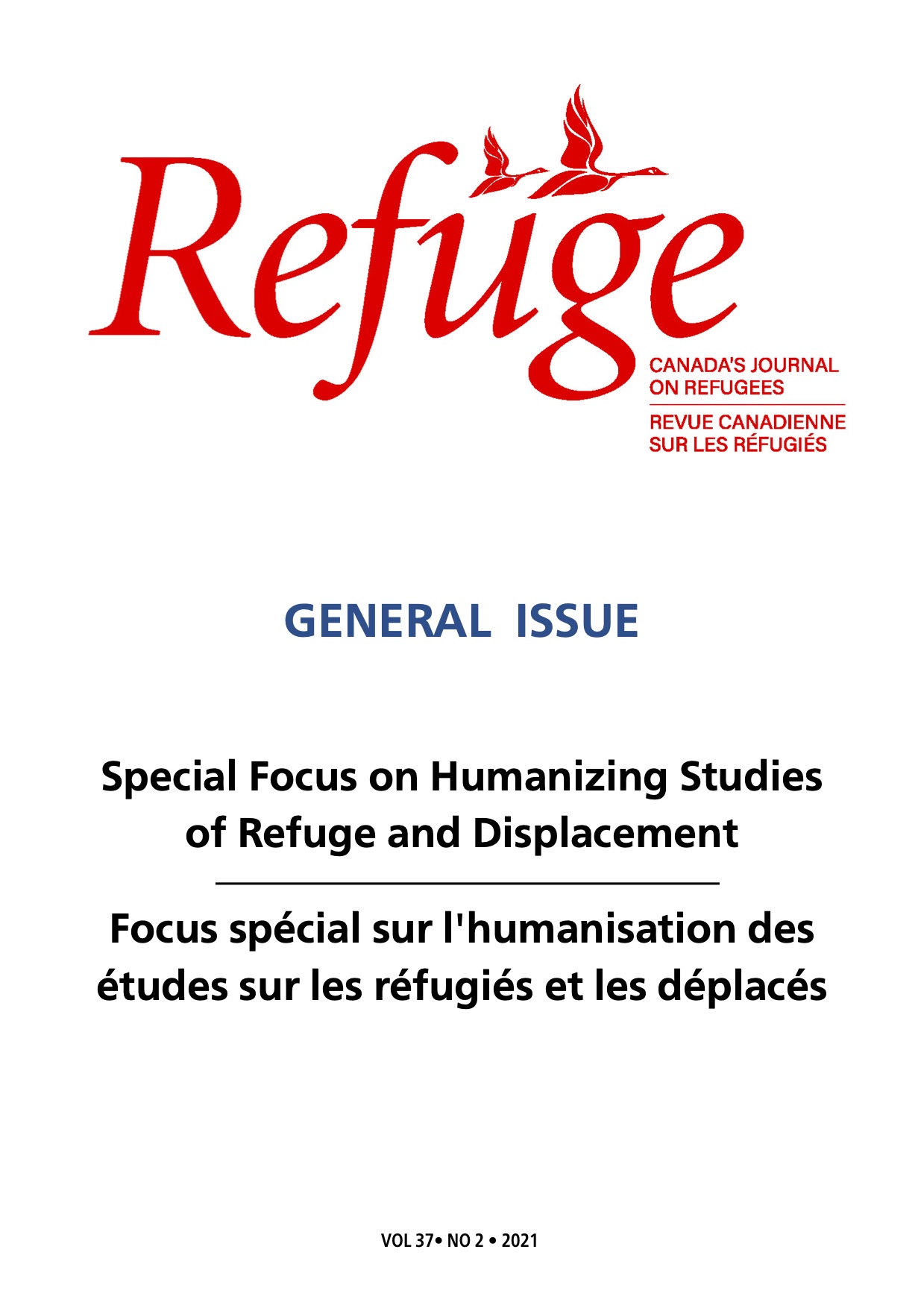“Is it Commerce?”: Dehumanization in the Framing of Refugees as Resources
DOI:
https://doi.org/10.25071/1920-7336.40796Keywords:
dehumanization, animalization, refugees-as-resources, discourse analysis, raceAbstract
The idea that “refugees are resources” has been promoted as countering the dehumanization that frames refugees as burdens or security threats. But is framing people as resources truly humanizing? Resource theorists have highlighted how modern Western conceptions of what resources are depends on a distinction between the human and the non-human. This logic is similar to, and originates in the same epoch as, hierarchies of humanity. State appraisal and management of human and mobility continue to be shaped by race and perceptions of productive value in terms, just as the value of resources varies, and has always been social and political. This intervention highlights the perspective of a Burundian refugee in Tanzania who traces continuities between experiences and being called a resource—in that a resource can be sold or traded across borders with no input into its future. Refugees can and do meaningfully contribute to the communities and countries in which they live, but the “resources” lens curtails a truly humanizing perspective on refugees’ lives.
Metrics
References
Betts, A., & Collier, P. (2017). Refuge: Transforming a broken refugee system. Penguin Random House.
Brankamp, H. (2021). Camp abolition: Ending carceral humanitarianism. Antipode. Advance online publication. https://doi.org/10.1111/anti.12762 DOI: https://doi.org/10.1111/anti.12762
Brankamp, H., & Daley, P. (2020). Laborers, migrants, refugees. Migration and Society, 3(1), 113–129. https://doi.org/10.3167/arms.2020.030110 DOI: https://doi.org/10.3167/arms.2020.030110
Bridge, G. (2009). Resources. In D. Gregory, R. Johnston, G. Pratt, M. J. Watts, & S. Whatmore (Eds.), Dictionary of human geography (5th ed., pp. 648–649). Wiley-Blackwell.
Crawley, H. (2017). Migration: Refugee economics [Review of the book Refuge: Transforming a broken refugee system, by A. Betts & P. Collier]. Nature, 544, 26–27. https://doi.org/10.1038/544026a DOI: https://doi.org/10.1038/544026a
Daley, P. (1989). Refugees and underdevelopment in Africa: The case of Barundi refugees in Tanzania [Doctoral dissertation, University of Oxford]. Oxford University Research Archive. https://ora.ox.ac.uk/objects/uuid:61d14ce2-4a9c-4a13-9a56-6360094cf502
Daley, P. (2007). Gender & genocide in Burundi: The search for spaces of peace in the Great Lakes Region. James Currey.
Fiddian-Qasmiyeh, E. (2020). Introduction: Refuge in a moving world: Refugee and migrant journeys across disciplines. In E. Fiddian-Qasmiyeh (Ed.), Refuge in a moving world: Tracing refugee and migrant journeys across disciplines (pp. 1–19). UCL Press. DOI: https://doi.org/10.2307/j.ctv13xprtw.7
Gilmore, R. W. (2017). Abolition geography and the problem of innocence. In G. T. Johnson & A. Lubin (Eds.), Futures of Black radicalism (pp. 225–240). Verso.
Harrell-Bond, B. (1995). Refugees and the international system: The evolution of solutions. Oxford Refugee Studies Centre. https://www.rsc.ox.ac.uk/files/files-1/rr-refugees-international-system-1995.pdf
Harrell-Bond, B. (2002). Can humanitarian work with refugees be humane? Human Rights Quarterly, 24, 51–85. http://www.jstor.org/stable/20069589 DOI: https://doi.org/10.1353/hrq.2002.0011
Haslam, N., Loughnan, S., & Sun, P. (2011). Beastly: What makes animal metaphors offensive? Journal of Language and Social Psychology, 30(3), 311–325. https://doi.org/10.1177/0261927x11407168 DOI: https://doi.org/10.1177/0261927X11407168
Hyndman, J. (2000). Managing displacement: Refugees and the politics of humanitarianism. University of Minnesota Press.
Hyndman, J., & Reynolds, J. (2020). Beyond the global compacts: Re-imagining protection. Refuge: Canada’s Journal on Refugees, 36(1), 66–74. https://doi.org/10.25071/1920-7336.40768 DOI: https://doi.org/10.25071/1920-7336.40768
Institute for Geographies of Justice JHB 2015. (2015, August 3). RUTH WILSON GILMORE [Video]. YouTube. https://www.youtube.com/watch?v=dmjgPxElk7A&t=3046s
Johnston, R. (2009). Race. In D. Gregory, R. Johnston, G. Pratt, M. Watts, & S. Whatmore (Eds.), Dictionary of human geography (5th ed., pp. 615–617). Wiley-Blackwell.
Kyriakides, C., Taha, D., Charles, C. H., & Torres, R. D. (2019). Introduction: The racialized refugee regime. Refuge: Canada’s Journal on Refugees, 35(1), 3–7. https://doi.org/10.7202/1060670ar DOI: https://doi.org/10.7202/1060670ar
Masabo, J., Kweka, O., Boeynik, C., & Falisse, J.-B. (2018). Socio-economic assessment in the refugees camps and hosting districts of Kigoma region. UNHCR. https://reliefweb.int/report/united-republic-tanzania/socio-economic-assessment-refugee-camps-and-hosting-districts-kigoma
Morris, J. C. (2019). Violence and extraction of a human commodity: From phosphate to refugees in the Republic of Nauru. The Extractive Industries and Society, 6(4), 1122–1133. https://doi.org/10.1016/j.exis.2019.07.001 DOI: https://doi.org/10.1016/j.exis.2019.07.001
Mullings, B. (2017). Race, work, and employment. In International encyclopedia of geography (pp. 1–13). John Wiley & Sons. https://doi.org/10.1002/9781118786352.wbieg0660 DOI: https://doi.org/10.1002/9781118786352.wbieg0660
Ramsay, G. (2020). Humanitarian exploits: Ordinary displacement and the political economy of the global refugee regime. Critique of Anthropology, 40(1), 3–27. https://doi.org/10.1177/0308275X19840417 DOI: https://doi.org/10.1177/0308275X19840417
Schmitt, G. (2017). Avoiding a lost generation of refugees through jobs and education [Press release]. World Economic Forum. https://www.weforum.org/press/2017/05/avoiding-a-lost-generation-of-refugees-through-jobs-and-education/
Skoll.org. (2016). Alexander Betts: “Refugees as a resource” | Skoll World Forum 2016 [Video]. YouTube. https://www.youtube.com/watch?v=1tiYqc_B3c4&list=PLHao2fgbzdxL8PmhIxaqmInOdqMhc41hn&index=9
TUKI (Taasisi ya Uchinguzi wa Kiswahili) (Ed.). (2000). Kamusi ya Kiswahili–Kiingereza (Swahili–English Dictionary). University of Dar es Salaam.
Turner, L. (2019). “#Refugees can be entrepreneurs too!” Humanitarianism, race, and the marketing of Syrian refugees. Review of International Studies, 46(1), 137–155. https://doi.org/10.1017/s0260210519000342 DOI: https://doi.org/10.1017/S0260210519000342
Turner, S. (2004). Under the gaze of the “big nations”: Refugees, rumours and the international community in Tanzania. African Affairs, 103(411), 227–247. https://doi.org/10.1093/afraf/adh006 DOI: https://doi.org/10.1093/afraf/adh006
Vaughan-Williams, N. (2015). “We are not animals!” Humanitarian border security and zoopolitical spaces in Europe. Political Geography, 45, 1–10. https://doi.org/10.1016/j.polgeo.2014.09.009 DOI: https://doi.org/10.1016/j.polgeo.2014.09.009
Whitaker, B. E. (1999). Changing opportunities: Refugees and host communities in western Tanzania (New Issues in Refugee Research, Working Paper No. 11). UNHCR. https://www.unhcr.org/3ae6a0c70.pdf
Wynter, S. (2003). Unsettling the coloniality of being/power/truth/freedom: Towards the human, after man, its overrepresentation—An argument. The New Centennial Review, 3(3), 257–335. https://doi.org/10.1353/ncr.2004.0015 DOI: https://doi.org/10.1353/ncr.2004.0015
Zamore, L. (2018). Refugees, development, debt, austerity: A selected history. Journal on Migration and Human Security, 6(1), 26–60. https://doi.org/10.1177/233150241800600102 DOI: https://doi.org/10.1177/233150241800600102
Published
Versions
- 2021-11-22 (2)
- 2021-11-22 (1)
How to Cite
Issue
Section
License
Copyright (c) 2021 Yolanda Weima

This work is licensed under a Creative Commons Attribution-NonCommercial 4.0 International License.
Refuge authors retain the copyright over their work, and license it to the general public under the Creative Commons Attribution-Non Commercial License International (CC BY-NC 4.0). This license allows for non-commercial use, reproduction and adaption of the material in any medium or format, with proper attribution. For general information on Creative Commons licences, visit the Creative Commons site. For the CC BY-NC 4.0 license, review the human readable summary.







